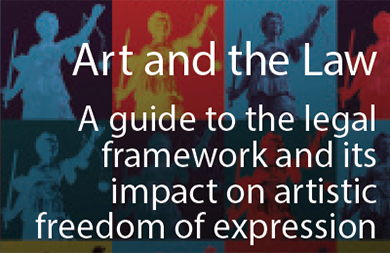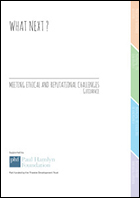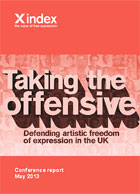8 Jan 2018 | Awards, News, Press Releases
[vc_row][vc_column][vc_column_text]
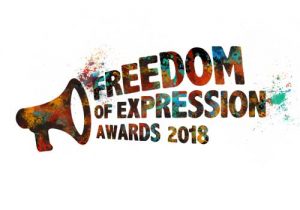
Index on Censorship Freedom of Expression Awards Fellowship 2018
Index on Censorship is proud to announce that long-time BBC reporter Razia Iqbal and CEO of the world famous Serpentine Galleries Yana Peel will join a panel of judges to decide the 2018 Freedom of Expression Awards Fellowship winners.
The Freedom of Expression Awards, now in their 18th year, honour champions of free expression and those battling censorship around the world in the field of arts, campaigning, digital activism and journalism. Many have faced prosecution and punishment for their work.
Peel sits on advisory boards for the Tate, the British Fashion Council and the Lincoln Center for the Performing Arts, and is a young global leader of the World Economic Forum. Currently CEO of the Serpentine Galleries, she previously ran Intelligence Squared Group, a leading forum for live debate, and was a regular contributor to the Davos annual meeting and the DLD, particularly on topics at the intersection of technology and visual art.
Iqbal has been an arts correspondent for the BBC for over a decade and is one of the main presenters of Newshour, the flagship news and current affairs programme on BBC World Service radio, and regularly presents The World Tonight on BBC Radio 4.
Iqbal says “In my lifetime, there has never been a more critical time to fight for freedom of expression. Whether it is in countries where people are imprisoned or worse, killed, for saying things the state or others, don’t want to hear, it continues to be fought for and demanded. It is a privilege to be associated with the Index on Censorship judging panel.”
The judging panel will also include Raspberry Pi Ltd CEO Eben Upton, founder of the Raspberry Pi Foundation, a UK-based charity that advances computer science education in schools, who was recently elected to the fellowship of the Royal Academy of Engineering in 2017; and Tim Moloney QC, deputy head of Doughty Street Chambers and Band 1 of Crime Silks, classed as leading silk in the current Legal 500.
Announcing the judging panel, Index on Censorship chief executive Jodie Ginsberg said:“Freedom of expression is a right that our award winners and nominees work tirelessly to defend. The awards draw attention to the repression that they face every day and give us a chance to celebrate and support these inspiring journalists, activists, and artists.
“We’re excited to announce this year’s remarkable panel of judges, who are leaders and experts in their fields. The Freedom of Expression Awards Fellowship recognise global free speech heroes and provide assistance so that their important work can continue.”
Previous winners of the Freedom of Expression Awards include Nobel Peace Prize winner Pakistani education campaigner Malala Yousafzai, Chinese political cartoonist Rebel Pepper and Yemeni street artist Murad Subay. Hundreds of public nominations are made for the awards each year. Many of those nominated are regularly targeted by authorities or by criminal and extremist groups for their work. Some face regular death threats, others criminal prosecution.
Previous judges include digital campaigner and entrepreneur Martha Lane Fox, Nobel laureate Wole Soyinka, Harry Potter actor Noma Dumezweni, novelist Elif Shafak, award-winning journalist and former editor-in-chief of Vanity Fair and The New Yorker Tina Brown and human rights lawyer and shadow Brexit secretary Keir Starmer.
The Freedom of Expression Awards Fellowship ceremony 2018 will be held on April 19 in London.
For Index on Censorship
Sean Gallagher, [email protected]
About the Freedom of Expression Awards Fellowship
Winners of the 2018 Freedom of Expression Awards Fellowship receive 12 months of capacity building, coaching and strategic support. Through the fellowships, Index seeks to maximise the impact and sustainability of voices at the forefront of pushing back censorship worldwide. More information
About Index on Censorship
Index on Censorship is a London-based non-profit organisation that publishes work by censored writers and artists and campaigns against censorship worldwide. Since its founding in 1972, Index on Censorship has published some of the greatest names in literature in its award-winning quarterly magazine, including Samuel Beckett, Nadine Gordimer, Mario Vargas Llosa, Arthur Miller and Kurt Vonnegut. It also has published some of the world’s best campaigning writers from Vaclav Havel to Elif Shafak.[/vc_column_text][/vc_column][/vc_row][vc_row][vc_column][vc_row_inner][vc_column_inner width=”1/2″][staff name=”Razia Iqbal, Journalist” profile_image=”97201″]Razia Iqbal is a presenter for BBC News: she is one of the main presenters of Newshour, the flagship news and current affairs programme on BBC World Service radio. She also regularly presents The World Tonight on BBC Radio 4, a British weekday current affairs radio programme broadcast. Iqbal has hosted HARDtalk Extra, a BBC television and radio programme that conducts in depth one-on-one interviews with significant artists such as Pakistani pop star Haroon and prolific American writer, Joyce Carol Oates. She was the BBC’s arts correspondent for a decade, and has worked as a political reporter and a foreign correspondent in Pakistan and Sri Lanka. Iqbal has also made several successful documentaries through the BBC and presented on a variety of programmes. She was born in Kampala, Uganda and came to London as a child. Iqbal graduated with a BA in American Studies from the University of East Anglia and was nominated in 2013 for the “Services to Media” award at the British Muslims Awards. [/staff][/vc_column_inner][vc_column_inner width=”1/2″][staff name=”Tim Moloney QC, Barrister” profile_image=”97202″]Tim Moloney QC is the deputy head of Doughty Street Chambers. His practice encompasses crime, extradition, international criminal law, international death penalty litigation, public law and media law. Moloney consistently acts in high profile litigation across the spectrum of his practice. He also advises high profile organisations on their exposure to involvement with acts of terrorism and is regularly involved in training of lawyers overseas in the law and practice relating to terrorism and the death penalty. He also regularly advises media organisations on issues they face relating to terrorism and disclosure. Following the completion of his Ph.D, Moloney was a lecturer in law before being called to the Bar in 1993. He became a QC in 2010. He continues to write and lecture extensively. He is the author of the sexual offences, terrorism and appeals sections of the leading reference work, Blackstone’s Criminal Practice, and is the author of the sentencing chapters in Rook and Ward on Sexual Offences. Moloney is also a member of the panel of experts for Halsbury’s Laws.[/staff][/vc_column_inner][/vc_row_inner][/vc_column][/vc_row][vc_row][vc_column width=”1/2″][staff name=”Yana Peel, Chief Executive” profile_image=”97203″]Yana Peel is CEO of the Serpentine Galleries, London, one of the most recognised organisations in the global contemporary art, design and architecture worlds. Prior to this she ran Intelligence Squared Group, the leading forum for live debate. Having co-founded Outset Contemporary Art Fund in 2003 as a hub for creative funding solutions for cultural projects, Peel maintains advisory positions across the arts that include: Tate, British Fashion Council, V-A-C Foundation Moscow, Lincoln Center and Asia Art Archive. At ParaSite Art Space and Intelligence Squared, she serves as board co-chair. Peel is a young global leader of the World Economic Forum and a regular contributor to the Davos annual meeting and DLD, particularly on topics at the intersection of technology and visual art. Her two children provide inspiration for her best-selling book series, Art for Baby, which benefits the National Society for the Protection against Cruelty to Children (NSPCC). Peel was born in St Petersburg, Russia, attended McGill University, completed her post-graduate studies in Economics at LSE, and started her career at Goldman Sachs.[/staff][/vc_column][vc_column width=”1/2″][staff name=”Eben Upton CBE, Chief Executive” profile_image=”97204″]Eben Upton CBE is a founder of the Raspberry Pi Foundation and serves as the CEO of Raspberry Pi Ltd, its commercial and engineering subsidiary. He is the co-author, with Gareth Halfacree of the Raspberry Pi User Guide, and with Jeff Duntemann and others of Learning Computer Architecture with Raspberry Pi. He was elected to the Fellowship of the Royal Academy of Engineering in 2017. In an earlier life, he founded two successful mobile games and middleware companies, Ideaworks 3d and Podfun, held the post of director of studies for Computer Science at St John’s College, Cambridge, and wrote the Oxford Rhyming Dictionary with his father, Professor Clive Upton. He holds a BA in Physics and Engineering, a PhD in Computer Science, and an MBA, from the University of Cambridge.[/staff][/vc_column][/vc_row][vc_row][vc_column][vc_separator][/vc_column][/vc_row][vc_row full_width=”stretch_row_content” equal_height=”yes” css=”.vc_custom_1515150485442{background-color: #cb3000 !important;}” el_class=”text_white”][vc_column width=”1/2″][vc_custom_heading text=”Support the Index Fellowship” font_container=”tag:h2|text_align:center” use_theme_fonts=”yes” link=”url:https%3A%2F%2Fwww.indexoncensorship.org%2Fsupport-the-freedom-of-expression-awards%2F|||”][vc_column_text]
By donating to the Freedom of Expression Awards you help us support individuals and groups at the forefront of tackling censorship.
[/vc_column_text][/vc_column][vc_column width=”1/2″ css=”.vc_custom_1515150288338{background-image: url(https://www.indexoncensorship.org/wp-content/uploads/2017/04/2017-awards-fellows-1460×490-2.jpg?id=89631) !important;background-position: center !important;background-repeat: no-repeat !important;background-size: cover !important;}”][/vc_column][/vc_row][vc_row][vc_column][vc_separator][/vc_column][/vc_row][vc_row][vc_column][vc_custom_heading text=”Don’t lose your voice. Stay informed.” font_container=”tag:h3|text_align:left” use_theme_fonts=”yes”][vc_row_inner][vc_column_inner width=”1/2″][vc_column_text]Index on Censorship is a nonprofit that campaigns for and defends free expression worldwide. We publish work by censored writers and artists, promote debate, and monitor threats to free speech. We believe that everyone should be free to express themselves without fear of harm or persecution – no matter what their views.
Join our mailing list (or follow us on Twitter or Facebook) and we’ll send you our weekly newsletter about our activities defending free speech. We won’t share your personal information with anyone outside Index.[/vc_column_text][/vc_column_inner][vc_column_inner width=”1/2″][gravityform id=”20″ title=”false” description=”false” ajax=”false”][/vc_column_inner][/vc_row_inner][/vc_column][/vc_row]
13 Dec 2016 | Awards, Press Releases
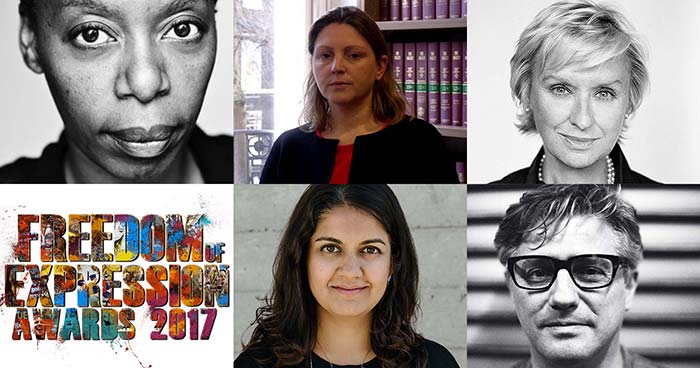
Harry Potter actor Noma Dumezweni, Doughty Street Chambers lawyer Caiolfhionn Gallagher, former Vanity Fair editor Tina Brown, Superflux co-founder Anab Jain and Heaven 17’s former manager Stephen Budd.
Harry Potter actor Noma Dumezweni will join a panel of judges that also includes Hillsborough lawyer Caiolfhionn Gallagher and former Vanity Fair editor Tina Brown to decide the 2017 Index on Censorship Freedom of Expression Award winners.
The awards, now in their 17th year, honour those at the forefront of challenging censorship in the field of arts, campaigning, journalism and digital advocacy. Many of the winners face regular persecution for their work.
Dumezweni, who plays Hermione in the stage play Harry Potter and the Cursed Child, was shortlisted earlier this year for an Evening Standard Theatre Award for Best Actress. Speaking about the importance of the Index Awards she said: “Freedom of expression is essential to help challenge our perception of the world”.
Caoilfhionn Gallagher is a public law specialist at Doughty Street Chambers who represented the bereaved families in the 7/7 London bombings, and the Hillsborough football stadium tragedy. In October 2016 she was named Human Rights and Public Law Junior of the Year at the Chambers UK Bar Awards.
“Freedom of expression is needed now more than ever, as many governments worldwide are attempting to stifle critical voices. Some do this in ways which are blatant breaches of fundamental freedoms, others’ methods are more subtle but still pose a significant threat to free speech and democracy. Now, more than ever, we must fight to protect and champion freedom of expression,” said Gallagher.
Other judges on the panel include Tina Brown, an award-winning journalist and former editor-in-chief of Tatler, Vanity Fair and The New Yorker; Anab Jain, TED fellow and co-founder of Superflux, a company focused on emerging technologies; and Stephen Budd, chairman of the Music Managers Forum and co-founder of Damon Albarn’s ‘Africa Express’ musical collaborations project.
Announcing the judging panel, Index on Censorship chief executive Jodie Ginsberg said: “No one should be punished for speaking freely — yet across the world we see journalists muzzled for challenging politicians, musicians silenced for questioning the status quo, or cartoonists forced to drop their pens because they mocked the powerful and the corrupt.”
“Our awards celebrate those who fight back. And we’re delighted to have such an impressive panel selecting this year’s winners.”
Previous winners of the Freedom of Expression awards include Nobel Peace Prize winner Malala Yousafzai, Israeli conductor Daniel Barenboim, and Russian journalist Anna Politkovskaya. Hundreds of public nominations are made for the awards each year. Many of those nominated are regularly targeted by authorities or by criminal and extremist groups for their work. Some face regular death threats, others criminal prosecution.
Previous judges include digital campaigner and entrepreneur Martha Lane Fox, Nobel laureate Wole Soyinka, novelist Elif Shafak, journalist and campaigner Mariane Pearl, and human rights lawyer Keir Starmer.
The Freedom of Expression Awards 2017 will be held on April 19 at the Unicorn Theatre.
For more information, please contact Helen Galliano: [email protected].
Notes for editors
Index on Censorship, founded in 1972 by poet Stephen Spender, campaigns for freedom of expression worldwide. Its award-winning quarterly magazine has featured writers such as Vaclav Havel, Nadine Gordimer, Arthur Miller, Philip Pullman, Salman Rushdie, Aung San Suu Kyi and Amartya Sen.
Award winners become Index on Censorship Freedom of Expression Award Fellows and receive training and support for a year after the awards to help them maximise the impact of their work.
29 Sep 2015 | Art and the Law Commentary, Artistic Freedom Commentary and Reports, mobile, News, United Kingdom
The following was presented at No Boundaries: A Symposium on the Role of Arts and Culture. Video of Julia Farrington and the day’s other speakers is available on the No Boundaries site.
In 1972, Michael Scammell, the first editor of Index on Censorship magazine, wrote in the launch issue: “Freedom of expression is not self-perpetuating but needs to be maintained by the constant vigilance of those who care about it.”
We obviously haven’t been very vigilant here in the UK.
As we heard last week, when the artist Mimsy’s work Isis Threaten Sylvania was removed from the Passion for Freedom exhibition at the Mall Galleries, London, artistic freedom of expression was put up for sale at £36,000.
And disturbing though it is, the news is a gift to those who have been concerned about the direction policing of politically or socially challenging art was taking. Now the situation is crystal clear and marks an alarming new approach to the policing of controversial art.
In last week’s case, the police were concerned about the “potentially inflammatory content” of Mimsy’s work, so they gave the organisers a classic Hobson’s Choice: if they went ahead with their plans to display it, they would have to pay the police £36,000 to cover the cost of security for the six-day show.
The police took the view that a perfectly legal piece of art, which had already been displayed without incident earlier in the year, was inflammatory. And in the balance of things as they stand, this opinion outweighs the right of the artist to express him or herself, the organisation’s right to present provocative political art, the audience to view it and those that protest against it, the right to say how much they hate it.
If this goes unchallenged, it will set a very dangerous precedent for foreclosing any work that the police don’t approve of.
But going against police advice is tough. In Index’s information pack on Public Order – part of a series of booklets looking at laws that impact on what is sayable in the arts, we ask the question: “What happens if police advise you not to continue with presenting a piece of work because they have unspecified concerns about public safety – and yet tell you it is your choice and they can only advise you?”
The answer is that in principle, in law, you are free to proceed.
But it goes on to talk about duties the organisation has to their employees and members of the public present on their premises, which fall under licencing and other obligations.
But the point is no one has taken this to the courts, so it hasn’t been tried and tested.
As it stands — and in the heat of a crisis when these decisions are mostly reached — police advice is a Hobson’s Choice in pretty much every case.
This latest example of policing comes hot foot after revelations in the summer that the police were involved in, though allegedly not directly responsible for, the cancellation of Homegrown.
And it is only a year since Exhibit B at the Vaults in London and the Israeli hip-hop opera The City in Edinburgh were cancelled on the advice of the police following protests outside both venues.
Way back in 2004 the theatre world was shocked when protest led to the closure of Gurpreet Kaur Bhatti’s play – Behzti following police advice. Gurpreet says that what shocked her most at the time, was how the politicians didn’t take the closure as an opportunity to challenge the police decision, defend her right, and promote the importance of freedom of expression.
Six years later, the Coventry police wanted £10,000 per night to guarantee the safety of the premier production of Gurpreet’s subsequent play Behud at the Belgrade Theatre, which was her creative response to having her play cancelled in Birmingham; and which, because of the playwright’s history of attracting controversy, was treated by the police as a public order issue from day one of the production.
When faced with the police’s bill, Hamish Glen, artistic director of the Belgrade wrote to the police and said it was a fiscal impossibility for the theatre to pay up, and would amount to de facto censorship of Gurpreet’s voice for a second time. They came back asking for £5,000 per night instead which got the same response from Hamish – and finally they waived the fee and the show went ahead without incident.
In investigating this for a case study I wrote, I asked how the police had come up with the figure, and the answer was that it was assessed by the same criteria for special police services at a football match or a music festival. There is no guidance on policing a not-for-profit arts organisation dealing with fundamental rights – it is not on the police radar.
Writing a case study on the policing of the picketing of Exhibit B by Boycott the Human Zoo earlier this year also gave a series of interesting insights
Only one police officer from British Transport Police – The Vaults are under Waterloo Station and therefore under BTP jurisdiction – and two Community Police Officers attended the demonstration of 200 people – so it was obviously not considered a priority, despite the fact that social and print media made it clear that the production was very divisive and both the Boycott and the Barbican had talked to the police.
When, as the protest escalated and extra police arrived, the officer who took charge, talked to Sara Myers, the organiser of the Boycott, asking what was going on – they seemed not to know anything about it. He asked Sara what she wanted. She said she wanted the Barbican to close the show, and she told him that they intended to picket each of the five performances if they did not. The officer’s response was this is much ado about nothing – we haven’t got the resources to police this – we have to be out fighting serious crime.
So The Heckler’s Veto was seen to be working in London and in Edinburgh, just as it had worked in Birmingham ten years previously. When faced with a noisy demonstration, the police showed that they would take the path of least resistance and advise closure of whatever was provoking the protest.
And now a year later, with the removal of Isis Threaten Sylvania, we have seen a shift from the police advising closure following protest, to the police contributing indirectly or directly to the decision to remove work to avoid protest.
This is pre-emptive censorship by the police and represents a major shift in policing and is a clear infringement of civil liberties. It threatens the arts as a space for public debate about the politics of the world we live in.
Though of course because of the paradox of censorship, it actually has the opposite effect, it has amplified the work and many, many more people will be talking about that work because of the police’s move to close it. That doesn’t lessen the sting of the police’s new boldness and the trajectory they seem to be on with this latest act of censorship.
But let’s look at it from the police’s point of view. They are facing massive cuts themselves. George Osbourne’s latest figures indicate at the lowest end – a 25% cut on top of previous rounds. There are fewer police officers on the streets than at any time since the 1970s.
There is no guidance about policing of artistic freedom of expression, compared to pages of guidance on managing protest which stresses on every page the right to protest. When it comes to artistic cases it is left to professional judgement. I have spoken to several senior police officers about this and they will admit that mistakes have been made, but there have never been any consequences for these mistakes, so they remain quite blithe about them. And the bottom line with the police is always public safety.
They also, I believe, feel they have jurisdiction over certain volatile and socially sensitive areas of society where they have duties to prevent crime and to maintain law and order and have community cohesion responsibilities. So when artists venture into this territory with work that may cause offence, their reaction is to simply remove the provocation.
We also now have elected police commissioners who have political agendas – where inevitably policing unpopular, minority voices is going to come low on their agenda – however brilliant they may be, or however important they might be to the fundamental tenets of a liberal democracy.
And this has never been challenged. There has never been any judicial review of the policing of artistic freedom of expression. Judicial Review is the recourse that any arts organisation has when faced with what they consider to be inadequate or unfair policing. Actions by the police are subject to review by the courts for a number of reasons, including for instance if the police failed to consider alternatives to closure, or Article 10 rights generally.
We can and should expect more of the police. Tamsin Allen – senior partner at Bindmans states in an article she wrote for the case study of Behud: “The police have an obligation to fulfil their core duties – those are now enhanced by their duties under the Human Rights Act not to act incompatibly with the European Convention on Human Rights. The convention imposes both a qualified obligation not to interfere with the exercise of the right to freedom of expression and protest and a positive obligation to take appropriate steps to protect those rights. This may change if the Human Rights Act is abolished.”
And we are talking here about legal expression. We do not see artists going to court in the UK – the last major case in this country was Lady Chatterly in the 60s; the Oz Trial, the publishers of the poem The Love That Dares to Speak its Name in the 70s; and the lesser known case of the Human Earrings in 1989, being amongst the very few other cases.
It is also worth pointing out what is obvious – that nearly all the artworks that have been foreclosed by the police over the past few years deal with race and or religion and, Exhibit B notwithstanding, the majority of contemporary cases of contested art are by artists from black and ethnic minorities. This only emphasises the fact that freedom of expression is a biased affair in the UK and I believe will remain so while our society and our culture are not equal.
Acknowledging that, I would add to what Michael Scammell said – the space for freedom of expression has to be more than just maintained – it has to be enlarged and extended.
And as an urgent part of that, we have to challenge this culture of policing, this policing of culture.
The climate is not set fair for promoting the importance of artistic freedom of expression – the political climate is set against human rights. Policing as we have seen with absolute clarity this week in the case of Mimsy’s work, is subject to the prevailing laissez faire of the market place.
In late 2013, I asked Keir Starmer, former director of public prosecutions at the Crown Prosecution Service, if he felt there was a need for police guidance in the area of art and offence and he said emphatically yes. He said he thought it was going to be an increasingly major policing issue over the coming years. He was right.
We have to open up discussion at the highest level with police and the prosecution service, if we are to safeguard the space for freedom of expression in the arts, especially where it relates to political art. The climate might not be conducive, but it has not been tried before, systematically – it is uncharted – let’s go there.
15 Sep 2015 | Awards, Campaigns, mobile, Press Releases
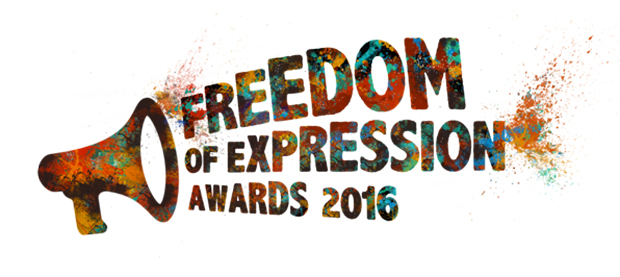
- Awards honour journalists, campaigners and artists fighting censorship globally
- Judges will include poet and playwright Wole Soyinka, pianist James Rhodes and human rights lawyer Kirsty Brimelow
- Nominate at indexoncensorship.org/nominations
- Nominations are open from 15 September to 19 October 2015
Beginning today, nominations for the Index on Censorship Freedom of Expression Awards 2016 are open. Now in their 16th year, the awards have honoured some of the world’s most remarkable free expression heroes – from Israeli conductor Daniel Barenboim to Syrian cartoonist Ali Farzat to education activist Malala Yousafzai.
The awards shine a spotlight on individuals fighting to speak out in the most dangerous and difficult of conditions.
Index invites the public, NGOs and media organisations to nominate anyone they believe deserves to be part of this impressive peer group: a hall of fame of some of those at the forefront of tackling censorship worldwide.
There are four categories in Index on Censorship’s Freedom of Expression Awards:
• Arts for artists and arts producers whose work challenges repression and injustice and celebrates artistic free expression.
• Campaigning for activists and campaigners who have had a marked impact in fighting censorship and promoting freedom of expression.
• Digital Activism for innovative uses of technology to circumvent censorship and enable free and independent exchange of information.
• Journalism for courageous, high impact and determined journalism that exposes censorship and threats to free expression.
Winners will be flown to London for the gala ceremony, which will take place at The Unicorn Theatre in London on 13 April 2016. In 2015, the ceremony was hosted by comedian Shappi Khorsandi, with awards presented by judges and special guests including Martha Lane Fox, Mariane Pearl, Elif Shafak and Keir Starmer.
Winners also become awards fellows and receive support to amplify their work for free expression. As fellows, winners become part of a world-class network of campaigners, activists and artists sharing best practice on tackling censorship threats internationally.
Jodie Ginsberg, CEO of Index, said: “The Freedom of Expression Awards turn up the volume on the censored and silenced. I encourage everyone, no matter where they are in the world, to nominate a free expression hero so their voices can be heard.”
The 2016 awards shortlist will be announced in late January 2016.
Judges in 2016 will include Nobel prize-winning Nigerian poet and playwright Wole Soyinka; Kirsty Brimelow QC, a human rights barrister and chair of The Bar Human Rights Committee of England and Wales; and classical pianist James Rhodes, whose memoir Instrumental was published earlier this year after the UK Supreme Court overturned a publication ban.
Rhodes said: “The Russian poet Yevgeny Yevtushenko once wrote: ‘When truth is replaced by silence, the silence is a lie’ – and to honour those who fight to speak out and break that silence is a privilege. Having experienced first hand the terrifying impact of censorship, I’m thrilled to be able to play a small part in acknowledging the bravery of those who continue to express themselves in the face of unimaginable oppression.”
For more information on the awards, please contact [email protected] or call +44 (0)207 260 2660.



